A well done video that sums up the last two years of our pandemic in less than five minutes…
Why I Haven’t Retired: It’s Hard to Explain…

When I complain about how much work I have to do, K says, “Well then, quit.”
I say, “I can’t quit.”
She says, “Of course you can. You could have retired 40 years ago.”
Then I say, “I don’t want to quit.”
Then she says, “Well then, stop complaining!”
She has a point. But when it comes to these later years of working, I want my cake and I want to eat it. I want to keep working and, when work is hard, I want to complain about it.
How to explain?
I want to keep working because I value the work I’m doing. I think – I know – that it’s useful. To some, I believe it is important. It also gives me a great deal of satisfaction. But it’s difficult. And time consuming. And sometimes downright upsetting.
Work is not play.
Play is fun. And I have playtime. I have my grappling, my crossword puzzles, my computer chess, and my cigar smoking. Two hours of that sort of fun per day fills my play tank. My work tank is bigger. Much bigger. But it’s also, despite the stress and toil, more satisfying.
But K is right. I choose to work. And so, I must also choose to accept all that comes with it and stop bitching.
Marketing Mastery Series
Labels, Lizards, and Limbic Systems:
Understanding the Buyer Brain
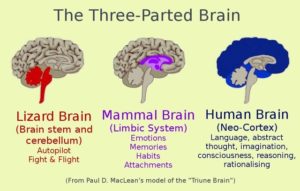
They say you shouldn’t judge a book by its cover. And that’s generally good advice. But most people do. Including me. We respond instinctively and emotionally to everything our senses encounter (and particularly to new sensations) because our brains are wired to do so.
There are three forms of natural intelligence and three intelligence systems in the human brain. The reptilian – or lizard – brain, the limbic brain, and the neocortical brain. Only one of them – the neocortical brain – is capable of not judging a book by its cover. The other two handle the other two forms of intelligence: instinct (the lizard brain) and feeling (the limbic brain).
Because Homo sapiens are naturally conceited, we tend to downplay the importance of our natural intelligence systems – instinct and feeling – and overplay the importance of what is unique to us – thinking. We shouldn’t. They are equally important. (One could argue, in fact, that, next to the opposable thumb, the development of the two “lower” levels of intelligence is the reason our species survived the early eons of evolution.)
Our decisions – big and small – are initiated in the limbic brain. Some, like pulling one’s hand from a hot stove, start and end there. Some, like falling in love, begin in the lizard brain, but grow and flourish in the limbic. And some, like the decision to buy a new car, are routed from the lizard brain to the limbic and then to the neocortical, where the decision is actually made.
None take place solely in the emotional or the rational brain. They all start with that first instinctive reaction.
Most people understand this at some unconscious or rudimentary level. And some people that study decision making understand it quite well. In the world of marketing, understanding how decisions are made is essential. Yet most of what I’ve read and heard from so-called marketing experts is flawed in this respect. They view the buying decision as a two-part process.
General (brand) advertisers see it as instinct and then emotion. Direct response advertisers see it as emotion and rationalization.
But if you want to be a master marketer, you have to understand that the buying decision is always a three-part process. And that means the selling strategy should be a three-part process, too.
First, is the lizard reaction, which takes less than a second. Second, is the emotional impulse, which can take place in several minutes to as long as an hour. Third is the rationalization, which has no time limit. It can take minutes. Or hours. Or days. Or months. Even years.
To repeat…
* The lizard reaction: This is the first instinctive signal that flashes through the prospective buyer’s brain when he/she first looks at the advertising.
* The emotional impulse: The limbic brain then moves in (tentatively or eagerly) to form an emotion.
* The rationalization: After the emotion is formed, the rational brain kicks in and does its work.
Important: These three brain functions – the reptilian reaction, the limbic impulse, and the rationalization – always occur in that order.
What does this mean to you, the aspiring marketing master?
- Recognize that any marketing/selling strategy that consists of only two parts is incomplete.
- If you are in general advertising, your expertise is in understanding instinct and emotion. To become a master in your universe, you must master rationalization. You must figure out how to assure that the-post-instinct, post-emotion desire to buy is not impeded by anything that happens before, during, or after the buying experience.
- If you’re in direct marketing, your expertise is in understanding emotion and rationalization. To become a master of your universe, you must master instinct. You must become expert at designing that initial instinct.
Do you see what I’m saying here? This feels like an important insight to me. I’m not sure, though, if I’ve explained it well. Let me know if you grok this. If not, I’ll dig into it again in another issue.
News & Views
COVID Update 1: Lockdown Scorecard
If you don’t want to believe it, this probably won’t change your mind. But a major study has just been published that concludes that the COVID lockdown had “little to no effect” on saving lives during the pandemic, but had “enormous economic and social costs where [the restrictions were] adopted.”
You can read the entire 69-page report here.
Or a summary of it here.
COVID Update 2: The Pandemic of the Unvaccinated
When Omicron was classified as a “Variant of Concern” by the WHO in November, just about everyone in the pro-vaccination community, from President Biden to Nancy Pelosi to Rachel Maddow to Howard Stern, began calling COVID a “pandemic of the unvaccinated.”
I thought that was a catchy phrase. But I was sort of appalled by the vitriolic sentiment that went along with it. (Howard Stern, for example, suggested that hospitals should not admit unvaccinated people.)
Since then, we’ve learned that vaccinations were not – and are not – able to provide immunity against or stop the spread of the virus. Latest fact I could find: Of the 77 million people that have been infected by the Omicron strain of COVID-19, only 11% (or 8 million) of them were not vaccinated. In other words, For the other 69 million, vaccinations didn’t stop the spread.
Complicated: College Discrimination Suit

The US Supreme Court is going to hear arguments about the role of race in the college admission process.
The Students for Fair Admissions claims that both Harvard, a private school, and the University of North Carolina, a public school, have been illegally restricting admissions for Asian-American applicants. (Harvard’s policies will be tested against the Civil Rights Act; UNC’s against the 14th Amendment.)
This is not news. Asian-American parents and educators have been objecting to these policies for decades. (How the issue finally made its way to the Supreme Court is a story for another day.)
It should be an interesting case. If the suit succeeds, it could put an end to all quota systems, including affirmative action admissions.
What I Believe: I believe that affirmative action – at some level and in some cases – is a natural and useful idea. But I also believe that it is ineluctably discriminatory. When the average GPAs and test scores of one racial community are disproportionately lower than those of another, the only way to admit more of the lower-performing group is to discriminate against the higher-performing group.
The arithmetic here is irrefutable, but there is an out that the Supreme Court can take if it wishes. And that is to say that objective measurements of performance (GPAs, testing, and even extra-curricular activities) are only part of what should be considered in making admission decisions. Subjective criteria (such as personality) are important, too. And this, in fact, is what Harvard and UNC do. Of course, the only way to logically employ this argument is to suggest that Asians have “less attractive” personalities.
Good to Know
About the Vietnam War

The war in Vietnam began in 1955. The US got involved in 1965. I don’t remember knowing anything about it until I entered high school, in 1964. Opposition to the war was a fringe issue then. But by 1968, negotiations to end the war officially began. Protests continued until 1973, when the governments of Vietnam and the United States signed the Paris Peace Accords. The agreement required the immediate withdrawal of all US troops, the return of prisoners of war, and the reunification of Vietnam through peaceful means. By that time, more than 1.3 million soldiers and civilians had been killed. Yet after US forces were removed from the conflict, the warring factions in Vietnam resumed fighting. Two years later, North Vietnam captured Saigon, the capital city of South Vietnam, and began reunification of the country under socialist rule, officially bringing an end to the Vietnam War.
Recommended Places
The Romance and Magic of Cartagena

Founded in 1533, Cartagena is a port city on Colombia’s Caribbean coast. It’s a short plane ride from Miami. Because of its beauty, history, and location, it’s one of the most visited cities in South America.
What I like about Cartagena:
* The architecture. Cartagena may be the most beautifully preserved Spanish Colonial city I’ve ever seen.
* The street art – murals, sculpture, and graffiti – in the Getsemani neighborhood.
* At night, the city is saturated with music and dancing – in clubs and outdoors in parks.
* It is an oasis for foodies, from street tapas to fine dining.
* Lots of interesting churches and monasteries throughout the city, including the San Pedro Claver Monastery.
Arts & Letters
From Letters of Note: Ralph Waldo Emerson to his daughter, April 8, 1854
“Finish every day and be done with it. For manners and for wise living it is a vice to remember. You have done what you could; some blunders and absurdities no doubt crept in; forget them as soon as you can. To-morrow is a new day; you shall begin it well and serenely, and with too high a spirit to be cumbered with your old nonsense. This day for all that is good and fair. It is too dear, with its hopes and invitations, to waste a moment on the rotten yesterdays.”
Words to the Wise
* A word I’d like to bring back into common parlance: ken
Rarely used today outside of the phrase “beyond one’s ken,” it means “range of vision or comprehension.” It goes all the way back to Proto-Indo-European, the ancestor of most European, Near Eastern, and South Asian languages. Its many relatives in modern English – all coming from the root “gno-” (“to know”) – include incognito, cunning, and know itself.
* A word I should know but don’t: scofflaw
A scofflaw is a person who habitually violates the law, especially laws that are difficult to enforce. Example: “A scofflaw seeks not to overturn the existing system – it may in fact be to his advantage if everyone else were to conform to it – but to flout it.” (God, Belief, and Perplexity by William E. Mann)
* A word I’m going to try to wedge into the next conversation I have about space: spaghettification
Spaghettification – also known as the “noodle effect” – is the theoretical vertical stretching of an object as it encounters extreme differences in gravitational forces, especially those associated with a black hole.
Readers Write
Re Ready, Fire, Aim:
“Ready, Fire, Aim is vintage Michael Masterson. Every sentence in the book is stuff you can use right now, today, to accelerate your climb to the top of the financial ladder. What sets Masterson apart from most of the gurus who write about how to do it is that he’s actually done it – over… and over… and over again. The number of successful businesses he’s built is no less than astonishing. Every serious entrepreneur needs to avail himself of the information in this book.” – RR
Re my prediction in the Feb. 3 issue that the digital dollar will eventually take over, at which point the government (and big tech) would have full financial control of US citizens:
“I wouldn’t have thought of this as an outcome/goal of the gov/big tech back in 2019, but after living through the past 2 years, I have no doubt you are spot on.” – DA
Losing weight the French way…
What I Believe: About Identity Theory
A Problem No One Seems to Have Noticed

Modern Identity Theory allows for the idea that gender identity is a “social construct,” and, as a social construct, it can be changed. A man that “identifies” as a woman has the right to be identified as a woman – by colleagues, friends, and even family.
In another essay, I will consider gender specifically. Today, I want to examine this idea of the social construct more generally. Can we change our identities? And, if so, under what circumstances?
You make a living as a machinist. You spend your evenings at a local bar, telling people you meet that you are a writer. You say you are a writer because you really want to be a writer. And you believe, deep down, that you are.
But the fact is – and this is something your parents, your friends, and even the bartender know – you are not a writer. You are a machinist that wants to believe he’s a writer. And believes that if he can get other people to see him as a writer, he’ll be one.
Reductio ad absurdum: You wake up early one morning feeling like a rooster. You get out of bed, strut rooster-like around the room, stick your head out the window and crow. You feel 100% rooster. Alas, you are not a rooster. You are a Homo sapiens with a mental illness.
I always wished that I were several inches taller. If I could become six foot two by feeling like I was six foot two, I’d do that. The objective and verifiable fact of the matter, however, is that I am five foot ten, and have been five foot ten my entire adult life. My mental health and the mental health of those around me will be much better if I don’t insist that I am six foot two.
You know where I’m going with this. And I’ll get to the gender debate next time. Today, I want to make an obvious point that I’ve not heard made.
It is this: Identities are not – and cannot possibly be – internally determined. They are not, therefore, and cannot be, subjective. That’s because the very concept of identification is external. Identification is about defining and classifying things that are outside of oneself. And there is a good and reputable scientific field of study that does that. It is called taxonomy. It works by describing and classifying the objectively categorical features of things.
In other words, identity, by definition, is that which can be described and categorized by objective measurements. Take away the objective perspective and the meaning of the word is gone.
Feeling like you are something doesn’t make you that something, because feeling is subjective and taxonomy is objective. If you want to be something other than what you are, you have to acquire the taxonomic characteristics of the thing you want to be.
This is not to deny the fluidity of human emotions. Or our inalienable right to have the emotions we want to have.
A machinist is not wrong to feel like he is meant to be a writer. And if he wants to spend his spare time deceiving himself about his actual identity, that’s his right. But he should not expect that others (people outside his internal reality) will consider him to be or treat him as a writer.
If you want to identify as a writer, all you need to do is spend most of your work time writing. If you want to identify as a rooster, see a therapist.
worth reading
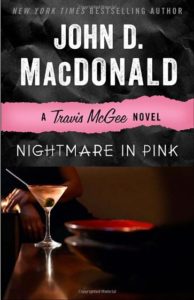
Nightmare in Pink
By John D. MacDonald
143 pages
First published in 1964 by Fawcett
What could be better when a flu or virus is keeping you in bed for the weekend than two days with Travis McGee?
Nightmare in Pink is only the second novel I’ve read by John D. MacDonald. It confirmed the positive feeling I had from my first encounter with this very gifted novelist. I intend to read more of this series.
The Plot
As a favor to Mike Gibson, an old war buddy, Travis agrees to help Mike’s sister, Nina, recover some money she’s owed. This leads him into a sinister conspiracy of theft, kidnapping, and mind-altering drugging.
What I Liked About It
* MacDonald is a very good writer. In terms of diction, dialog, and style, he’s right up there with other masters of the hard-boiled fiction genre, such as Dashiell Hammett and Raymond Chandler.
* Travis McGee isn’t your typical detective hero. Unlike Chandler’s Philip Marlowe, for example, he’s vain and opportunistic and clumsy – in a way that is commonplace now, but was unusual in the sixties and seventies when he was writing.
* McGee’s perspective on the world is scrumptiously bleak and sarcastic. Example:
“New York is where it is going to begin, I think. You can see it coming. The insect experts have learned how it works with locusts. Until the locust population reaches a certain density they all act like any grasshoppers. When the critical point is reached, they turn savage and swarm, and try to eat the world. We’re nearing the critical point. One day soon two strangers will bump into each other at high noon in the middle of New York. But this time they won’t snarl and go on. They will stop and stare and then leap at each other’s throats in a dreadful silence. The infection will spread outward from that point.”

John Dann MacDonald (July 24, 1916 – December 28, 1986)
MacDonald was a prolific author of crime and suspense novels, many set in his adopted home of Florida. One of the most successful American novelists of his time, he sold an estimated 70 million books.
Several of his books were made into movies. The best known are The Executioners (1957) and Cape Fear ((1962 and 1991).
Critical Reception
* In 1972, the Mystery Writers of America bestowed upon MacDonald its highest honor, the Grand Master Award for lifetime achievement and consistent quality.
* Stephen King praised MacDonald as “the great entertainer of our age, and a mesmerizing storyteller.”
* Kingsley Amis said MacDonald “is by any standards a better writer than Saul Bellow, only MacDonald writes thrillers and Bellow is a human-heart chap, so guess who wears the top-grade laurels.”
worth watching
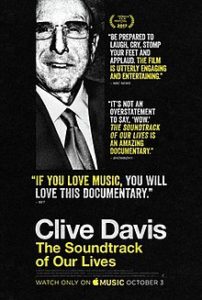
Clive Davis: The Soundtrack of Our Lives
Released in 2017
Directed by Chris Perkel
Available on various streaming services
Clive Davis: The Soundtrack of Our Lives is a documentary about the career of American record executive Clive Davis. It was based in his autobiography, The Soundtrack of My Life, published in 2013.
I came across the film when I was looking for another one, something recommended by a friend. On an impulse, I clicked on it to see who this Clive Davis was. It turns out he’s a well-known music industry executive that has been producing major talent for more than 50 years.
What I Liked About It
* His story.
* The story of his era in music.
* The many artists depicted.
The number of great artists Davis discovered/put on the map is amazing. An abbreviated list:
Janis Joplin
Paul Simon
Patti Smith
Kenny G
Bruce Springsteen
Carlos Santana
Whitney Huston
Aretha Franklin
The Grateful Dead
Toni Braxton
Billy Joel
The Notorious BIG
Usher
Alicia Keys
What I Didn’t Like So Much
The movie is hardly an in-depth or critical view of the man himself. It is a tribute, bordering on a puff piece. I would have liked to have been shown more about the slings and arrows of his fortune.
Critical Reception
* “An eye-opening, not to mention ear-opening, experience.” (Michael Rechtshaffen, LA Times)
* “We get the saga of a tender musical fairy godfather [but] you won’t learn much about Davis’s personal story.” (Variety)
* “It’s an extraordinary two-hour tale of a man with great ears and a passion to match.” (The Arts Desk)
* A “prolonged tribute reel with ample material to fuel a dozen lifetime achievement award ceremonies” and the film’s “hagiographic tone only worsens once Davis himself takes centerstage as the chief interview subject.” (IndieWire)
You can watch the trailer here.
Sacha Baron Cohen – He’s brilliant as a comic actor. He’s also very funny as a guest.
Oops!
Thanks to JJ for pointing out this goof in Wednesday’s PS.
“Hi Mark. I’m sure many others will write to you about this: Jethro Tull is the band. The lead singer and flutist is Ian Anderson. JT was one of my favourite bands growing up. Thick as a Brick and War Child were two of my top albums of the 70s. Saw them in concert three times!”
Bits and Pieces
Thoughts on Re-reading Ready, Fire, Aim:
The Inevitable Bloating of Corporate Payroll

If your business grows long or large enough, you are going to encounter payroll bloat – some number of employees at all levels of the biz that contribute little or nothing to the bottom line.
During the early stages of your company’s growth, you won’t have any trouble noticing this corporate rot and getting rid of it. That’s because (1) as the initial CEO of a relatively small company you will be close enough to see it. And (2) as the founder and principal shareholder, you will not tolerate waste.
But when the business gets larger – with tens of millions of dollars in revenues and several hundred employees – you will be far removed from the front lines. And those well-paid, low-to-no-contribution workers will start to disappear from your sight. You won’t notice them physically, because they’ll be floors or buildings or even cities away. And you won’t notice them on the P&Ls, because their costs will be several levels subordinated to the lines you are looking at.
I’ve seen this happen more than once. Because my interest in business is growth, when revenues and profits are rising, I’m not looking for leaks. But whenever I have looked, there’s always been some level of payroll waste.
I’m talking about redundant jobs. Full-time employees being paid to do part-time work. Highly paid execs doing little more than intermediating information.
What was scary about many of these investigations was that nobody was saying a damn thing about them. Not the department heads or management teams. Not the accounting department. And, of course, not a word from the employees that were underchallenged.
I don’t think these people were “covering up.” I think they simply weren’t aware of what had happened. The erosion of personnel productivity took place over years, little by little. Big-business regulations kicked in at a certain level, requiring the firing of red-tape processers. And certain functions, once necessary, became vestigial.
Carl Icahn, one of Wall Street’s most successful investors, ran into that problem several times in his career of building several huge businesses. I remember reading in one of his books or perhaps a magazine article that he made it a practice to fire 10% of his employees each year.
That could be apocryphal. I hope it isn’t, because I always thought it highlighted this problem – that with every additional layer of growth there will likely be an extra layer of low-output employees that must be repurposed or dismissed.
Click here to listen to Icahn tell a funny story about one of the times that he dealt with this problem.
News & Views: Law & Disorder Update

In my effort to keep you abreast of the rise in violent crime in America’s largest cities, here are three quick updates:
* Car thefts rampant in Portland. Click here.
* Chicago 2021: highest number of homicides in 25 years. Click here.
* Rookie cop gets shot on way to work in New York. Click here.
Interesting: About US Military History
How Many Times Has the US Declared War?

The United States has officially declared war 11 times during five separate military conflicts. The last time was during World War II.
The Korean War, the War in Vietnam, and the extended campaigns in Afghanistan and Iraq were not officially “wars.” They were military “actions” or “conflicts.”
The difference matters. According to the Constitution, our presidents are not authorized to declare war. Only Congress is. The founding fathers wisely wanted to make it difficult for us to get into expensive and deadly military engagements. It was almost as if they anticipated President Eisenhower’s 1961 warning about the “military-industrial complex”:
“In the councils of government, we must guard against the acquisition of unwarranted influence, whether sought or unsought, by the military-industrial complex. The potential for the disastrous rise of misplaced power exists and will persist.” – Dwight D. Eisenhower
From Letters of Note: John Steinbeck to His Lovesick Son, Nov. 10, 1958
“Thom,
“There are several kinds of love. One is a selfish, mean, grasping, egotistical thing which uses love for self-importance. This is the ugly and crippling kind. The other is an outpouring of everything good in you – of kindness and consideration and respect – not only the social respect of manners but the greater respect which is recognition of another person as unique and valuable. The first kind can make you sick and small and weak but the second can release in you strength and courage and goodness and even wisdom you didn’t know you had….
“And don’t worry about losing. If it is right, it happens. The main thing is not to hurry. Nothing good gets away.”
Great Places to Visit When You’re in LA:
The Getty Villa Museum

You’ve heard of The Getty Center in LA. By any standard, the museum and gardens are a must-see. Less known, but well worth a sunny morning, is the Getty Villa Museum in Malibu.
Another legacy project of J. Paul Getty, it is dedicated to the study of Greek and Roman art and culture. The collection is huge, with more than 44,000 antiquities from 6,500 BC to 400 AD.
Worth Quoting
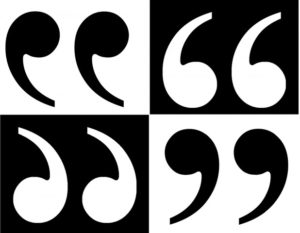
* “Success has always been easy to measure. It is the distance between one’s origins and one’s final achievement that matters.” – Michael Korda
* “To leave the world richer – that is the ultimate success.” – Eleanor Roosevelt
* “There is only one success… to be able to spend your own life in your own way,
and not to give others absurd maddening claims upon it.” – Christopher Morley
Readers Write…
Re the Feb. 3 issue:
CF on “The Digital Dollar” – “I thought your prediction was crazy when you made it. Now, I’m starting to believe!”
PJC on “The Problem With Managers Managing Up” – “Thank you for that piece on managers that ‘manage up.’ It came at just the right time. I’ve been puzzling about a profit center of our biz that has been falling off of late. I think you nailed it.”
AS on Buster Keaton vs. Charlie Chaplin – “I am still amazed at [Keaton’s] tenacity and creativity in a time well before special effects. How he didn’t break every bone in his body is a mystery.”
Was Jethro Tull a Great Flutist?

I was never a big fan of Jethro Tull until I saw him 10 years ago at a concert in Mumbai. (Of all places!) The auditorium was standing room only. The energy was palpable. He played, crane-like, standing on one leg. It was an unforgettable way to understand his appeal as a performing artist.
The most amazing thing about Tull, though, is that his principal instrument was the flute. The most unlikely instrument to be used in Rock and Roll. And Tull played the hell out of it. Was he a good flutist? I’m not capable of judging. But I found this video clip of a young, classically trained flutist reacting to a solo by Jethro Tull…
&;
Bits and Pieces
Suffocating in a Cloud of Digital Detritus!

I received a letter from a family member recently. A typewritten letter – actually typewritten, not laser printed – on an 8 x 10 sheet of paper. I tried to remember the last time I’d seen one of those.
This morning, it was sitting, folded, on my bedside table where I had left it. It looked odd. Lonely. Out of place. A fragile relic of the past.
When I began to write on computers, I made photocopies of my poems and stories to protect them from loss. I didn’t trust the computer to store them.
When the iCloud appeared, I was even more skeptical. But then, gradually, I stopped making copies and backing up my files. I had come to believe that everything I put into my computer is not just stored in the Cloud, but stored in perpetuity. I have several ways to delete files. But I’m pretty sure they are never entirely gone. I may be able to erase my access to them, but they are still up there, somewhere in that Cloud.
And that has given rise to a new fear: the possibility that all of my false starts and bad ideas and unkind sentiments are permanently stored in some digital library owned and operated by some digital information tsar.
There’s an ecological issue, too. For it’s not just my digital detritus that is being stored. It’s the data from every single input from every single online human on the face of the Earth.
Trillions of gigabytes of coded and traceable information!
A huge and ever-expanding miasma of energetic waste that is being inserted into the universe, growing exponentially every single day!
Essential Skills for Budding Entrepreneurs

A reader writes…
“I am a 23 yr old looking to level up in life. I recently bought and read your book Ready, Fire, Aim. I want to act on what I have learned. Do you have any insight you would be willing to share on opportunities you see around us today? Is learning to write copy going to be as beneficial in entrepreneurial adventures?” – HS
Dear HS…
You are on the right track.
As a would-be entrepreneur, there are three essential business skills you should learn. Marketing, salesmanship, and product development. Of those three, salesmanship (knowing how to sell your company’s products and services) is the most important.
It is the most important for two reasons. It will give you the best chance of successfully getting through the first and most challenging stage of your company’s growth. And it will, if you maintain that skill by staying active on the selling side of your business, keep you at the helm of your company as it passes through stages two, three, and four.
There are basically three ways to sell something: on the phone (telemarketing), in person (door-to-door), and in print (copywriting).
Each of these modes of selling will teach you different things.
* Telemarketing (especially outbound telemarketing) will teach you humility – that success in selling is about subordinating your ego to the market.
* Person-to-person selling will teach you sensitivity – how important it is to be able to instantly “read” the prospect’s emotional state.
* Copywriting will teach you self-discipline – the importance of le mot juste.
If you want to become the best salesperson you can be, you must learn all three of these skills. And that means spending time doing each one.
So, let’s tie this back to the reason you asked about the future of copywriting in the first place: your interest in pursuing a career as an entrepreneur…
What I’ve told you is that you should learn how to sell your company’s products and services even before you start your business.
Brand advertising is still important, but it’s changing. General and commodity marketing have been on the way out for years. Direct and personalized selling are the future. So, focus your learning on the three forms of direct and personalized selling. And know that of these three, copywriting has (in my opinion, at least) the greatest growth potential.
If you come to copywriting with the experience of having first sold by phone and door-to-door, it will come faster to you. More important, you will have a deeper and more enduring sense of how to write strong, effective copy for your growing business.
Is Trump Done?

I hesitate to mention her name, because my liberal friends will dismiss whatever she says because they think of her as a right-wing nut. I’ve been reading her commentary for about a year now. She is a hard-core conservative. And she doesn’t pull any punches. Sometimes I cringe. But I don’t doubt her acumen.
Recently, she said something about Trump that surprised me:
“No one wants Trump. He’s fading faster than Sarah Palin did – and she was second place on a losing presidential ticket. In case you don’t remember, for three years following that loss, Palin was packing stadiums with tens of thousands of Trump-like fans.”
She made a good argument. It’s the first I’ve heard like it. I’m wondering why would that be? Perhaps it’s because the mainstream media, which has done so well railing against Trump, would like nothing better than to have him run again in 2024.
That’s speculation. But you can read her argument here.
Is Demand for Old Masters Ebbing?

On Jan. 27, Sotheby’s had its annual “Old Masters” auction in NYC. It brought in $88.6 million (after buyer fees). A significant drop from last year’s $115 million.
According to a friend that attended, the sale room was crowded but the “excitement wasn’t there.” Fifty-five pieces went on the block, and 41 of them (75%) sold.
Recently, Suzanne, my partner in Ford Fine Art, and I did a quick study of the price history of art at auctions over the past several decades. I was surprised to see that the demand for Old Masters appeared to be waning.
That was also true of many Modernist masters. I have a theory about why that is, which I’ll talk about in a future issue.
What I Believe
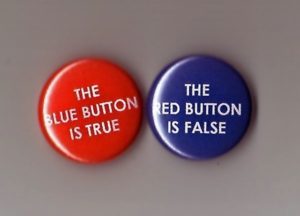
Every Truth has an Equal and Opposite Truth.
COVID Update
Because COVID quickly became a political (i.e., pro- and anti-Trump) issue, we’ve had a tough time getting unbiased information about it from the media. After two years of false claims on both sides, a few facts are becoming clear.

Debate: One of the most prominent debates was about immunity. The liberal media wanted us to believe that vaccinations were the best and perhaps the only defense against COVID. They disputed the conservative argument that natural immunity (from having had COVID) was equally good if not better protection.
Winner: In this debate, the conservative media turned out to be correct.
Facts: On Jan. 12, the CDC issued a statement attesting to the fact that natural immunity is stronger and lasts longer than immunity achieved through vaccinations. In the data cited, natural immunity was 29 times more effective in California and 15 times more effective in New York.
Honorary Mention: The liberal media didn’t lose the bet entirely. The same studies that showed that natural immunity was stronger than vaccination immunity also showed that the best protection was a combination of both – vaccinations and natural immunity. The infection rate for the smart and lucky people who had both was 33 times lower in California and 20 times lower in New York.

Debate: A second debate had to do with the effectiveness of cloth masks. On this issue, the liberal media was strongly in favor of them and the conservative media was skeptical.
Winner: The conservative media again.
Facts: “We have known for many months that COVID-19 is airborne and therefore a simple cloth mask is not going to cut it,” said Dr. Leana Wen, a public health professor at George Washington University. Finally, on Jan. 16, the CDC updated its guidelines. They didn’t come right out and say that we should avoid cloth masks, but did admit that, as compared to N95 and KN95 masks, they offer the least protection.
Interesting: Why Obese People Can’t Lose Weight

“It’s just calories in and calories burned.”
Obesity is not healthy. And, yes, some people are fat because they eat too much and exercise too little. But the science shows (and has repeatedly shown over the last 20+ years) that the primary reason for body size is metabolism, much of which is inherited.
Here’s a good breakdown on the difference between how an obese person processes food and how a normal person does…
Words to the Wise
* A word I want to use next time I’m in a flower shop: vermillion – a vivid red to orange. Example: “Oh yes! He loved yellow did good Vincent…. When the two of us were together in Arles, both of us insane, and constantly at war over beautiful colors, I adored red; where could I find a perfect vermilion?” (Paul Gauguin)
* A word I’ll wager I will want to use whenever I want to feel wise: alliteration – the repeated use of the same consonant in a phrase.
* A word I always misinterpret: canorous – I keep thinking it means an annoying or grating sound. It means quite the opposite, a melodious sound. Example: “Astounding, canorous, enchanting, alembicated and dramatic, the Chopin studies are exemplary essays in emotion and manner.” (Chopin: the Man and His Music by James Huneker)
An amazing performance of “(Sittin’on) The Dock of the Bay”…
You Are What You Think About in Your Spare Time

George works for a brand-name, multinational information publishing company. He’s good at what he does. He rose from entry-level to executive-manager level in record time. But he tells me he feels like his career is stalled. He feels like his boss doesn’t appreciate the good work he does. We talked about it…
Me: How do you feel about your job?
George: Bored. Frustrated.
Me: How do you describe your profession when people ask you what you do?
George: I tell them the truth. I’m a social media manager. And I tell them who I work for.
Me: What do you like to think about in your spare time?
George: What do you mean?
Me: I mean in your spare moments. When your mind drifts off.
George: I don’t know.
Me: What were you thinking about on your commute to work this morning?
George: My windshield wipers weren’t working. I was thinking about that.
Me: Anything else? Anything fun?
George: I guess I was thinking about this comedy routine I’m working on. I sometimes do stand-up on weekends.
I had no idea George did stand-up. I tell him what a brave and noble profession I think it is. He lights up. He talks about it animatedly for nearly half an hour.
Me: Well, George, maybe that’s the problem. You are a stand-up comic working as a social media manager.
He smiles. Then he frowns. He doesn’t agree.
What I Believe: Life is fluid. Our minds and hearts are fluid. We respond to circumstances. We make decisions. We take on roles. Things change. The outside things are easy to identify. The inside things sometimes not.
The trouble George is having is not his job, but his commitment to his job. During his early career, he was fully committed. Now he’s not. His core ambition – whether he admits it to himself or not – is comedy. That could change. In a year. In a month. In a week. But until that does change, he will not be a great social media manager. To be great at anything, you have to spend your spare time thinking about it.
About the Whoopi Goldberg “Issue”…
I get that her comments were uninformed.
I can understand why some people were upset. Click here.
But I don’t think she should have been “punished” for making them. “The View” is a talk show. (An amazingly dumb talk show.) Free speech should be the standard. I agree with Fox News commentator Sean Hannity on this…
Great Places to Visit: Santa Barbara

K and I are finishing a week in Santa Barbara. This is the second time we’ve been here and the second time I’ve had this thought: This is one of the most beautiful small cities in the USA.
Reasons to visit…
* Head-smackingly beautiful setting, between the San Ynez Mountains and the Pacific Coast
* Mediterranean climate
* Great wine country
* Spanish colonial architecture
Sites to see…
* Santa Barbara Harbor and Stearns Wharf
* Botanical Gardens
* Marco Lucchesi’s Section Wines Winery
* Shops and restaurants on State Street
